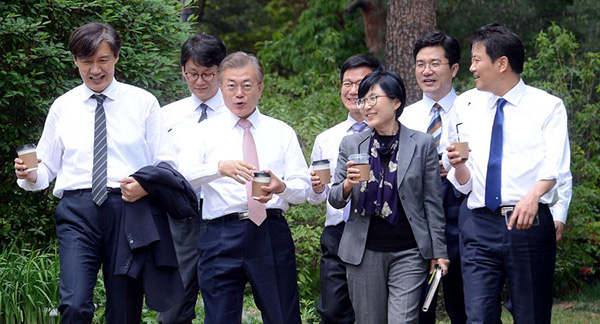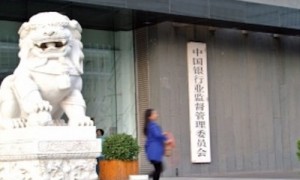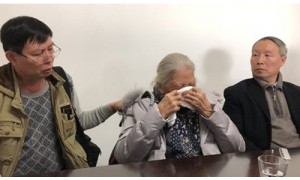
South Korean President Moon Jae-in takes a walk with senior presidential secretaries at the Presidential Blue House in Seoul, South Korea, May 11, 2017. [Photo/Agencies]
SEOUL - South Korean President Moon Jae-in on Sunday named top-level presidential staff and cabinet members on security, foreign affairs and economy.
Moon told a press conference at the presidential Blue House, announcing his appointment of Chung Eui-yong as his top national security advisor who leads the National Security Office of the Blue House.
Chung is a career diplomat who was mainly in charge of trade. He is a former lawmaker of the Uri Party, a predecessor of the current ruling Democratic Party.
During the presidential campaign, Chung led a special advisory group overseeing Moon's diplomatic policy. Since Moon's inauguration, Chung led the Blue House's advisory group on security and foreign affairs.
The appointment indicated Moon's will to place more significance on diplomacy, rather than a hard-line approach, in dealing with issues on the Democratic People's Republic of Korea (DPRK) and the Terminal High Altitude Area Defense (THAAD) missile interception system.
The top security post was usually assumed by former military commanders, which led to a hard-line approach to security issues. Chung's appointment heralded dialogue and diplomacy in South Korea's dealing with security.
Moon told reporters that under the past governments, security was seen from the narrow perspective of national defense, saying the diplomatic role became more significant in tackling the DPRK's nuclear program.
The qualification for the head of the National Security Office, Moon said, will be a diplomatic capability given the intertwined situations between security, diplomatic and economic affairs.
Asked about THAAD, Chung said the US missile shield deployment lacked of a procedural legitimacy, noting that South Korea's position on THAAD was explained sufficiently to relevant countries, which he said recognized South Korea's position.
Moon Chung-in, an honorary professor at Yonsei University in Seoul, and Hong Seok-hyun, former chief of a local newspaper and cable channel, were named special presidential aides for unification, security and diplomatic affairs.
Prof. Moon is a noted South Korean expert on international politics who is known to have been deeply involved in setting theoretical foundations for a so-called "Sunshine Policy" of engagement with the DPRK and a balanced diplomacy in Northeast Asia.
Hong is a former ambassador to the United States and was sent to Washington earlier this week as special envoy of President Moon. He is known to have a broad range of personal network in the United States.
President Moon told reporters that he will discuss the new government's policy stance on unification, security and diplomatic affairs together with the two new special aides.
On the economic front, Chang Ha-sung, an economics professor at Korea University in Seoul, was appointed as a new presidential chief of staff for policy which was newly created under the Moon government. The post is tasked with coordinating economic policies.
Chang is a celebrated South Korean intellectual who has been actively participating in civic group activities for the reform of conglomerates, or chaebol. He focused on the reform of corporate governance in chaebols.
The appointment reflected Moon's campaign pledge on the chaebol reform, which was strongly demanded by the general public over the deep-rooted collusive ties between politicians and businessmen that were again revealed in the impeachment of Moon's predecessor.
President Moon told reporters that Chang is a person most suited to push for an economic democratization and an income-based growth by changing economic and social policies that are centered on people and small firms.
Two cabinet members in charge of economic and diplomatic affairs were appointed first, indicating Moon's focus on the two main issues and their urgency.
Kim Dong-yeon, president of Ajou University, was named finance minister who doubles as deputy prime minister.
Kim lost his father when he was 11 years old, and has since then served as a breadwinner. He is a self-made man who passed a civil service exam and assumed senior posts for economic affairs in the cabinet and presidential office.
President Moon said Kim is a capable economic bureaucrat who has a comprehensive insight and a capability of coordination, adding that he can sympathize the difficulties of people as he became a senior government official from a child breadwinner.
Kang Kyung-hwa, a special advisor to the UN secretary-general, was tapped to lead the foreign ministry. Kang will become the country's first female foreign minister following the parliamentary confirmation hearings.
A prime minister nominee is required to be approved by the National Assembly, but other cabinet members take office after the confirmation hearings.







